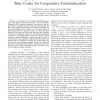Free Online Productivity Tools
i2Speak
i2Symbol
i2OCR
iTex2Img
iWeb2Print
iWeb2Shot
i2Type
iPdf2Split
iPdf2Merge
i2Bopomofo
i2Arabic
i2Style
i2Image
i2PDF
iLatex2Rtf
Sci2ools
CORR
2007
Springer
2007
Springer
On Four-group ML Decodable Distributed Space Time Codes for Cooperative Communication
— A construction of a new family of distributed space time codes (DSTCs) having full diversity and low Maximum Likelihood (ML) decoding complexity is provided for the two phase based cooperative diversity protocols of Jing-Hassibi and the recently proposed Generalized Non-orthogonal Amplify and Forward (GNAF) protocol of Rajan et al. The salient feature of the proposed DSTCs is that they satisfy the extra constraints imposed by the protocols and are also four-group ML decodable which leads to significant reduction in ML decoding complexity compared to all existing DSTC constructions. Moreover these codes have uniform distribution of power among the relays as well as in time. Also, simulations results indicate that these codes perform better in comparison with the only known DSTC with the same rate and decoding complexity, namely the Coordinate Interleaved Orthogonal Design (CIOD). Furthermore, they perform very close to DSTCs from field extensions which have same rate but higher de...
Cooperative Diversity Protocols | CORR 2007 | Education | Low Maximum Likelihood | Space Time Codes |
| Added | 13 Dec 2010 |
| Updated | 13 Dec 2010 |
| Type | Journal |
| Year | 2007 |
| Where | CORR |
| Authors | G. Susinder Rajan, Anshoo Tandon, B. Sundar Rajan |
Comments (0)

